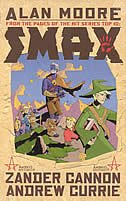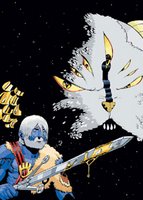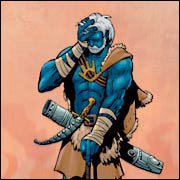Smax. Damn that was a good read. I’ve never read Top 10, and the book
 isn’t on my list of essential reads but I may have to make a bit of room for it now. So for anyone who doesn’t know two of the characters take a leave from their superhero cop title and spend some time in a sword and sorcery fantasy world. One of them, the big blue guy, is from there and is returning for his uncle’s funeral.
isn’t on my list of essential reads but I may have to make a bit of room for it now. So for anyone who doesn’t know two of the characters take a leave from their superhero cop title and spend some time in a sword and sorcery fantasy world. One of them, the big blue guy, is from there and is returning for his uncle’s funeral.Long story short, much hijinx ensues. Allison asked me what I was reading because I kept chuckling (Allison is my spouse/girlfriend/significant other - what do you call someone you live with for years but aren’t married to that doesn’t sound ridiculous?). The best thing I could come up with was Shrek for adults. In a lot of ways that’s exactly what this book is. Because it isn’t written primarily for children the characters are allowed to have expressions and emotions that I can identify with. The message is a pretty basic one and is similar to that other movie I’ve mentioned but it isn’t presented in a pandering to the kids type of way. Not that Shrek pandered either but the message needs to be more obvious for a younger audience not so here.

Anyone who ever lived in a small town or an industrial town and left will be able to identify a bit with this story. That plays a huge role here. Jeff who “Americanized” his name from Jaafs is going back home from the big city. An it’s a home that he’s been conflicted about for a long time. This is a really common experience for a lot of people throughout the world. Here in Canada the east coast, where I grew up, is a lot like the fantasy land here (in the small town/big city respect, not dragons etc). There is a general exodus of youth from the place who then return somewhat older and somewhat wiser but apprehensive about the place they left behind.
Jeff left on something of a low note. He ran away from what he perceived to be a horrible, embarrassing and ass-backwards situation. I’m not sure how he is in the regular series, but here he seems to have tried to remain separate from pretty much everything. He wants to be an independent man who can support himself and is respected by others. He basically wants to take care of himself. The problems he has with his old home town isn’t necessarily how others perceive it but how Jeff thinks others will perceive it and him by connection. I see it all the time as well where other east coasters allow their brethren to make fun of the east coast but it just doesn’t sit right when people “from away” make fun of the place. Make a joke about anyone’s home town and it’s the same thing – even if they hate the place the joke will feel like an insult to them as well because they were raised there. The first real world decision most people make is to leave home so there is always a sense of “what if” at play when people think of the place they left behind.
Other than that the plot is just a riot. I love the Englishness of the queue for the questing license and the general Kafkaesque bureaucracy mixed with Tolkienesque fantasy tropes. The writing is top notch as one would expect from Alan Moore’s reputation alone. The dialogue is just fantastic. Equal parts epic speech, slang, sarcasm and ABBA songs. There’s a weird sort of happy cynicism going on. There’s an unintentional hero who doesn’t think he’s an unintentional hero who is generally angry but is only happy when he’s angry. Is Alan Moore always this hard to explain? I feel like my descriptions of his works are as wordy as his panel descriptions…

Then there’s the artwork. This is the unexpected gem of the story for me at least. I love the general scrawl of the linework that makes it look like most of my notebooks and textbooks from my school days. I spent as much time doodling in the margins as I did reading, writing and ‘rithmaticing. That’s what most of the panels here feel like too. Every crowd scene references something (and I’m sure I missed half). I saw Trogdor from the Homestar Runner website (go to Strong Bad e-mails/dragon if you haven’t seen that yet you poor soul), a wacky-races car (Mutley’s I believe), an advert from the Matrix, Dirk the Daring, Luke Skywalker, and even the Disney animated fox Robin Hood among many more. I’m left wondering if this was all in Alan Moore’s instructions or if Zander Cannon just ran with things. I do have to admit that the pixie projects with familiar mushroom houses was fricking hilarious as were the numerous Deaths. I have a soft spot for grim reapers in comedies. I say that a metaphysical personification of Death can help any story.
So to sum up. Smax = Good.
2 comments:
I have read all Top Ten, but haven't read Smax.
Thanks for the review - it sounds like there's more to it than I was expecting.
You're welcome. It really was a fun read, especially if you like mixing humour with fantasy. It's a great little story that stands on it's own.
Post a Comment